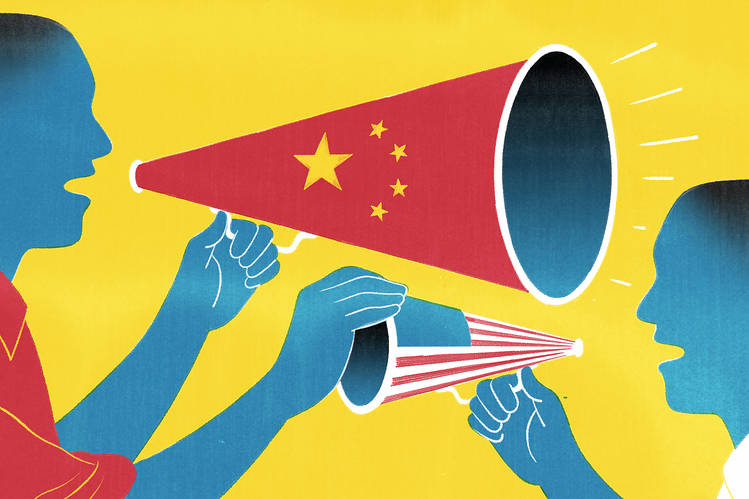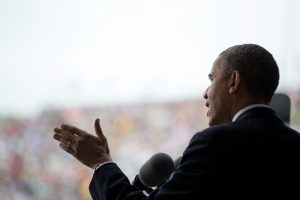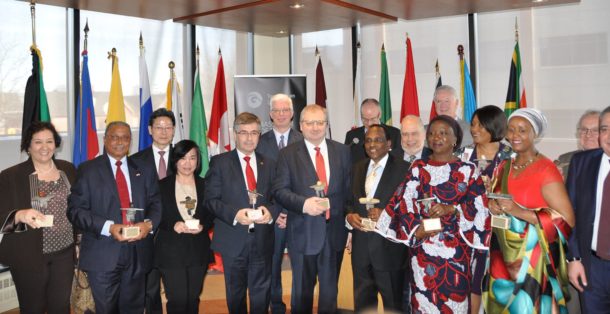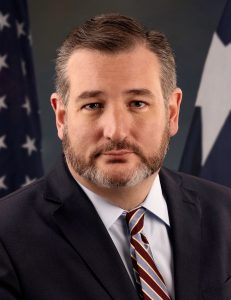Orville Schell and Larry Diamond, The Wall Street Journal, Dec. 21, 2018 10:51 a.m. ET uncaptioned image from article
uncaptioned image from article
President Donald Trump insists that China has been ripping off America for decades, but even if the two countries manage to negotiate—and honor—new terms for trade, basic reciprocity will still be sorely lacking elsewhere in the relationship and will continue to create tensions.
Consider the stark imbalance in media access. In the U.S., Beijing has established both a radio network and a television network, which distribute state-controlled programming to American audiences. China also publishes newspapers and magazines here in Chinese and English, Chinese websites are available to Americans online, and the U.S. readily gives work visas to Chinese reporters, who then feed content back to state-run propaganda organs at home.
By contrast, American media aren’t permitted to operate any television or radio networks in China, and the government partially or completely blocks the websites of most major U.S. news organizations. The only American publications generally available focus on such topics as lifestyle and business, including Vogue, Elle and special “China editions” of Forbes and the Harvard Business Review. The Chinese government also systematically blocks access to Twitter, Facebook, YouTube and Google.
As for life on the ground for U.S. journalists, the veteran Washington Post correspondent and author John Pomfret, who has spent decades in China, told us: “I’ve been followed, tapped, taped, detained and even expelled…Visas are denied or held up sometimes for years. Interviews are canceled at the last minute by ubiquitous ‘foreign affairs’ officers who work to impede, not facilitate, news coverage. Chinese translators and fixers are forced to report on all activities in their foreign bureaus or risk reprisals.”
Nor is this lack of reciprocity confined to the media, as we and a working group of top China specialists show in a new report addressing these issues.
American scholars in China too often find themselves denied visas and cut off from archives, libraries, fieldwork and government officials, while no such restrictions impede the work of their Chinese counterparts in the U.S., even those coming from think tanks sponsored by the government or the Communist Party. The Chinese government freely engages American audiences and spreads its propaganda by buying expensive advertising inserts in American newspapers, but it heavily constrains the public diplomatic [JB emphasis] outreach of the U.S. in China. At the same time, Chinese scientists and engineers obtain visas for advanced study in the U.S. in fields such as semiconductors, robotics, AI, virtual reality and gene editing that will increasingly determine global economic leadership and military supremacy, but there is no equivalent American access to China’s most sensitive research.
Winston Lord, a former U.S. ambassador to China and a contributor to our report, suggested that the Chinese should heed a teaching from Confucius. When asked, “Is there a single word that can serve as a guide to conduct throughout life?” the sage replied: “The one word is perhaps the word shu (meaning ‘reciprocity’ or ‘forgiveness’). Do not impose on others what you would not want them to impose on you.”
In the eyes of a growing number of Americans, pushback against China’s lack of reciprocity is now both justified and overdue. But how did we reach this point, and why has the U.S. accepted such unequal treatment across so many key areas of the relationship for so long?
Both of us came of age politically in the era after Richard Nixon and Henry Kissinger made their breakthrough trip to China in 1972 and forged new relations with Mao Zedong and Zhou Enlai. It allowed many of us to dare imagine that the U.S. and China could “peacefully coexist,” even cooperate, despite their different political systems, values and cultures.
After Mao’s death in 1976, Deng Xiaoping not only unexpectedly returned from political exile to lead China but soon went to Washington to normalize relations. At the same time, he pressed forward a tectonic agenda of pragmatic “reform and opening up” that gave rise to the notion of “engagement.” The idea was that if the U.S. just kept interacting with China—doing more business, facilitating more educational and cultural exchanges—the two countries would find common ground, and China would slowly evolve into a more open society.
For as long as China was progressing toward a more rules-based and seemingly democratic future, Americans could justify staying engaged with a Marxist-Leninist one-party state. The bloodbath in Tiananmen Square in 1989 interrupted such dreams, but Deng and his successor, Jiang Zemin, still managed to rescue the economic reform project and even negotiated China’s entry into the World Trade Organization in 2001.
While the hope of China as a more responsible “global stakeholder” had life, American policy makers were willing to cut the country’s communist leaders some slack on such issues as human rights, Tibet and Taiwan. Progress might be slow, they rationalized, but as long as China was committed to a “peaceful rise,” engagement still seemed like a sound bet.
What began upending this bargain was China’s turn over the past decade in a more mercantilist, militarily aggressive and politically authoritarian direction, a trend that has only gained momentum since the ascent of Xi Jinping in 2012. China continues to keep whole sectors of its economy off-limits to U.S. businesses, while expropriating American intellectual property and circumscribing the activities of American civil-society organizations, religious groups, media outlets, think tanks and academics. This glaring—and now growing—absence of reciprocity has caused a range of Americans involved in U.S.-China relations to reconsider the viability of engagement.
The Chinese have long decried the “unequal treaties” forced on their country by Britain, France, the U.S. and other colonial powers during the 19th century. One might think that this history would give their leaders greater sensitivity to the inequities now destabilizing relations with the U.S., but they still seem far away from understanding the perilous nature of the unbalanced situation they have created.
What to do? As a practical matter, if China is going to restrict visas for American journalists and scholars, the U.S. should take this into account when weighing visa access for Chinese media executives and even for journalists and scholars. If CNN and The Wall Street Journal cannot freely broadcast and publish in China, the ability of Chinese companies to invest in American media and cultural enterprises—including movie studios and theater chains—should be more closely scrutinized. If China heavily circumscribes U.S. public-diplomacy efforts in China, it should have implications for the scope of travel and activities allowed to Chinese diplomats in the U.S. Finally, America should redouble its resolve to find and fund innovative means of disseminating independent news and ideas in China.
Technology transfer in sensitive fields is now largely a one-way street. The U.S. needs to stop the bleeding of its technological edge by better helping to defend American corporations against the appropriation of their intellectual property. Visa applications by Chinese scientists and engineers seeking advanced study and research in areas that touch on national security should be more closely examined. At a minimum, the U.S. can stop granting visas to Chinese scientists and engineers sponsored by or working for the People’s Liberation Army.
Getting China to agree to a new level of fairness and reciprocity may be exceedingly difficult and even create some risks, but it is the only path to a healthier, more durable relationship between the two countries.
—Mr. Schell is the Arthur Ross Director of the Center on U.S.-China Relations at the Asia Society. Mr. Diamond is a senior fellow at the Hoover Institution and the Freeman Spogli Institute at Stanford University. They are co-chairs of the Hoover Institution working group that recently published “Chinese Influence & American Interests: Promoting Constructive Vigilance,” from which this essay is adapted.
Original Article
Public diplomacy John Brown's Public Diplomacy Press and Blog Review China Gets Its Message to Americans but Doesn’t Want to Reciprocate







